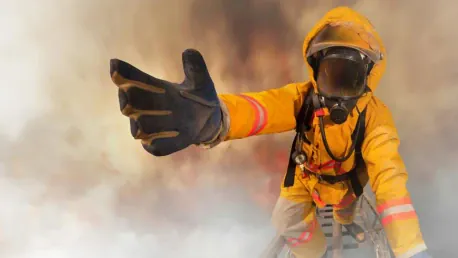Fierce, destructive wildfires have become a grim staple of America’s summers, and as these infernos rage, brave first responders donning bulky, protective gear rush headlong into danger. Yet, their biggest battle might not even be the flames; it’s the silent, insidious enemy known as cancer. As cancer rates among firefighters climb, a new legislative effort aims to provide much-needed support, but it faces significant political and practical challenges.
A Growing Crisis for Firefighters
Could federal assistance finally catch up with the escalating cancer crisis among America’s heroes? Facing an unprecedented rise in cancer cases, firefighters are not just fighting fires but also grappling with serious health risks. In recent years, the connection between firefighting and cancer has become undeniably clear, raising alarms across the nation.
The Real-World Toll of Firefighting Hazards
The alarming link between firefighting and cancer is well-documented, and the recent wildfires in Los Angeles have only intensified the dangers. Studies repeatedly show that firefighters are exposed to carcinogens, increasing their risk of developing various cancers. With events like wildfires releasing toxic pollutants, the toll on these first responders’ health is profound. Statistics reveal that firefighters have a 14% higher chance of dying from cancer compared to the general population, making it a leading cause of line-of-duty deaths.
Real-life stories from affected firefighters underscore the urgency of addressing this crisis. These accounts reveal the hidden dangers of their noble profession, highlighting the need for protective measures and comprehensive support systems.
The Honoring Our Fallen Heroes Act: Objectives and Provisions
The Honoring Our Fallen Heroes Act aims to mitigate these risks by offering federal assistance to firefighters diagnosed with service-related cancers. The bill’s key goals include providing financial support and healthcare benefits to affected firefighters and their families. It offers resources to help firefighters manage the burden of cancer treatment and its associated costs.
This bill strengthens existing support structures by expanding the scope of the Public Safety Officers’ Benefits Program, ensuring more comprehensive coverage. Unique features include provisions that specifically target cancer-related health issues, making it a pivotal advancement over current programs.
Political Challenges in Passing the Bill
Despite its critical objectives, the bill faces considerable political hurdles. Previous legislative attempts in 2024 highlighted potential pitfalls, such as garnering insufficient support or failing to secure necessary funding. The current political climate, with its heightened emphasis on budgetary constraints, poses additional challenges.
Senators Adam Schiff and Alex Padilla are vocal proponents of the bill, providing valuable insights and advocating for its passage. Their support, however, is only one piece of the puzzle, as broader political consensus is necessary to bring this initiative to fruition.
Implementation Roadblocks and Lessons from the Past
Successfully implementing the bill’s provisions involves navigating a complex landscape of potential pitfalls. One significant challenge lies in defining and documenting eligibility criteria for service-related illnesses. Historical comparisons with the September 11th Victim Compensation Fund and the World Trade Center Health Program illustrate the logistical difficulties of managing such large-scale support systems.
John Feal, a prominent advocate, and Attorney Michael Barasch emphasize the critical need for clear standards and adequate funding. Their experiences with post-9/11 initiatives spotlight the importance of meticulous planning and resource allocation to avoid similar pitfalls.
Solutions and Strategies for Effective Implementation
To ensure the effective implementation of the Honoring Our Fallen Heroes Act, clear and straightforward eligibility standards are essential. Lessons from previous initiatives demonstrate the necessity of unambiguous criteria to prevent deserving responders from being overlooked. Additionally, securing sufficient funding and staffing is crucial to manage the anticipated increase in demand for benefits and support.
Practical steps involve coordinated efforts from legislators, advocacy groups, and communities. These collective actions can significantly enhance the effectiveness of the bill, ultimately providing firefighters with the support they need.
Systemic support and resources are critical to this process, underscoring the importance of a united front in advocating for and implementing meaningful change. With the collective efforts of all stakeholders, there is potential for a robust support system that truly honors the sacrifices of firefighters.
In conclusion, addressing the occupational hazards faced by firefighters requires not only legislative action but also meticulous planning and sufficient allocation of resources. With clear standards and dedicated advocacy, the Honoring Our Fallen Heroes Act has the potential to offer a lifeline to firefighters battling cancer, ensuring they and their families receive the support and care they deserve.









